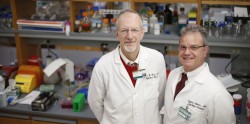Vanderbilt University’s AIDS Clinical Trials Unit (ACTU) has received a seven-year grant renewal from the National Institutes of Health (NIH).
The ACTU will receive approximately $1.4 million this year to continue studies aimed at improving treatment and ultimately developing a vaccine to prevent HIV infection.

Originally established in 1987 with a focus on vaccines, Vanderbilt’s HIV Vaccine Clinical Research Site (CRS), now part of the HIV Vaccine Trials Network, and its Therapeutics CRS, part of the AIDS Clinical Trials Group, have partnered since 2004 as the Vanderbilt ACTU.
The NIH grant (AI069439) also supports a new partnership with the Therapeutics CRS at Washington University School of Medicine in St. Louis.
“This (grant) is critically important because we are the only site in our region doing HIV-related clinical research, both in vaccine discovery and therapeutics,” said David Haas, M.D., director of the Vanderbilt Therapeutics CRS and professor of Medicine, Pathology, Microbiology and Immunology (PMI), and Pharmacology.
Vanderbilt’s continued participation in the national Clinical Trials Group Network will enable it to contribute to NIH’s “big-picture goals,” he said, including efforts “to prevent all new infections and to ultimately discover a cure for HIV for people who already are infected.”
Haas is one of three co-principal investigators of the grant. The others are Spyros Kalams, M.D., associate professor of Medicine and PMI, and David Clifford, M.D., professor of Neurology and Medicine at Washington University with whom Haas has collaborated for several years.
Clifford’s “expertise is in neurologic complications of HIV,” Haas said. “A lot of my work has been on genetics. Our collaborations have been largely the overlap between genetics and neurologic complications.” These can include neuropathy and cognitive difficulties related both to HIV infection and its treatment.
While current HIV therapies enable many patients to live long, productive lives, treated HIV infection is not without problems including chronic inflammation, which can increase the risk for heart attacks, strokes and other complications.
The search for a vaccine is equally important. “It will be virtually impossible to treat our way out of this epidemic,” Kalams said. “There’s too much unrecognized infection, too many people at risk. A vaccine is still imperative to stopping the epidemic.”
The human immunodeficiency virus is a wily opponent, capable of changing its genetic structure at a rate “much, much higher” than the influenza virus, he said.
Nevertheless, a recent vaccine trial conducted in Thailand showed a protective effect of about 30 percent. “We’re still trying to understand exactly what about that vaccine might have protected people,” Kalams said.
“None of this would be possible without people being willing to volunteer for these research studies, both HIV-negative and HIV-positive individuals,” Haas said. In addition, “we have a phenomenal research team which includes nurses, laboratory technicians, data managers (and) regulatory support people.”
For more information or to volunteer for clinical trials of new therapies, contact Deborah Sutherland at 936-8516 or deborah.sutherland@vanderbilt.edu. For the vaccine studies, contact Victor Sorrell at 343-8140 or vic.sorrell@vanderbilt.edu.
The Vanderbilt HIV Vaccine Trials Network team also includes Katie Crumbo, R.N., Cindy Hager, Colby Passaro, Naomi Prashad, N.P., Gwendolyn Rees, Kyle Rybczyk, FNP-MSN, Rita Smith, Shonda Sumner, R.N., and Gregory Wilson, M.D.
The Vanderbilt AIDS Clinical Trials Group includes Vicki Bailey, R.N., Becky Basham, Sandra Bohn, Husamettin Erdem, Joan Gottesman, R.N., Todd Hulgan, M.D., MPH, Brenda Jackson, Michael Leonard, Shane Moore, Ursula Powers, Fred Nicotera and Bill Wester, M.D., MPH. Gina Perez leads the administrative team.















